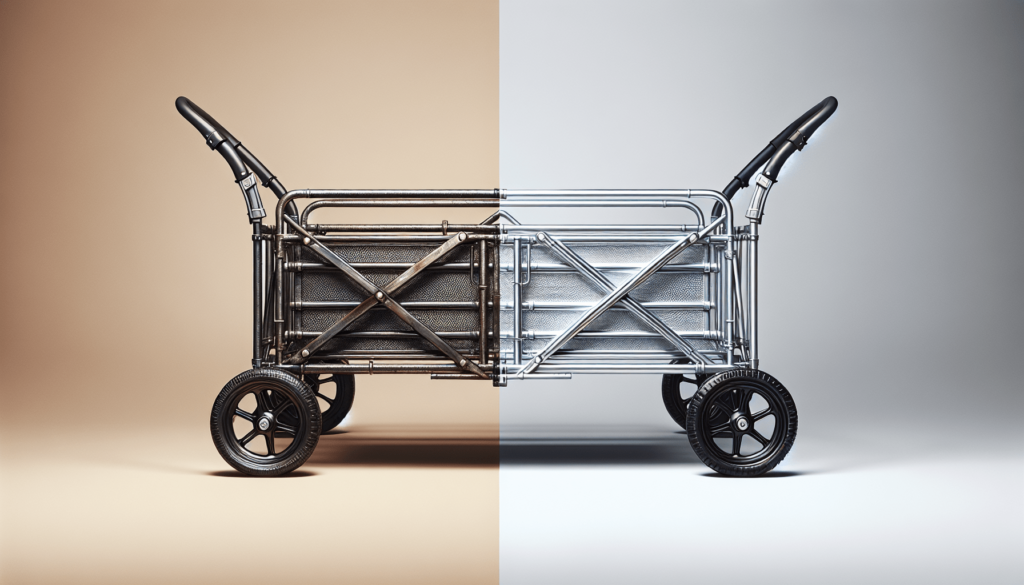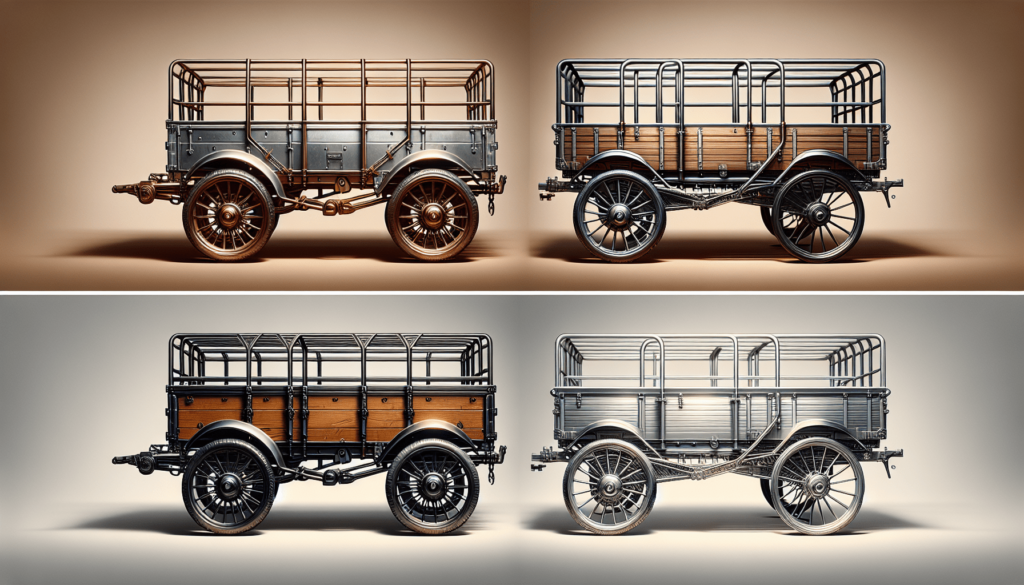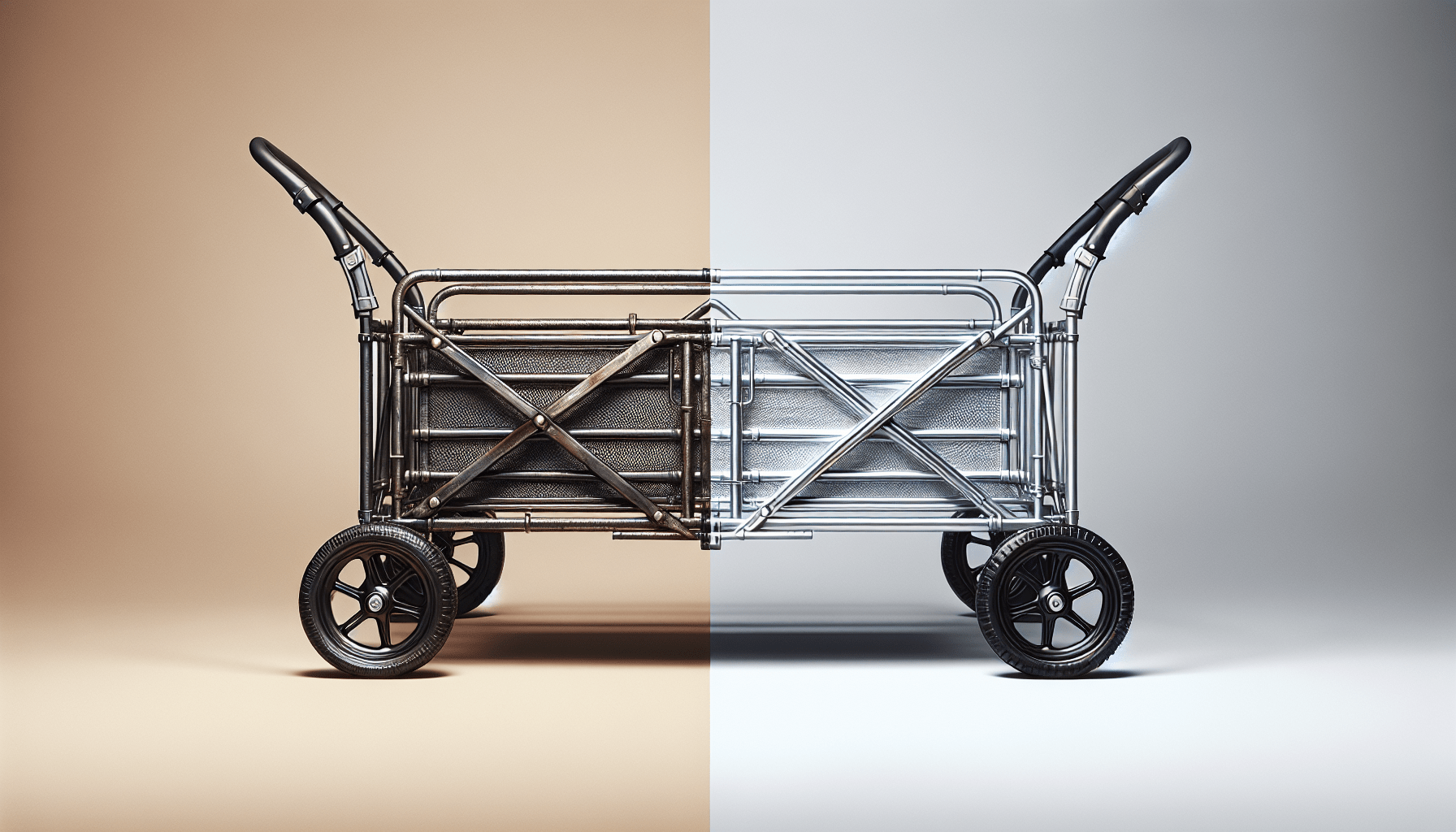Have you ever found yourself in need of a reliable folding wagon and wondered which material is best for the frame: steel or aluminum? Choosing between these two options can feel overwhelming, especially when each material has its own set of advantages and disadvantages. Let’s break down the differences so you can make an informed decision that suits your needs.

Understanding Folding Wagons
Folding wagons are versatile tools that can be used for various purposes, from family outings to gardening projects. They provide a convenient way to transport items, offering practicality and convenience. However, the choice of materials for the frame significantly influences the wagon’s durability, weight, price, and overall performance.
The Importance of Frame Material
The frame material is the backbone of any folding wagon. It affects not only how much weight the wagon can carry but also its portability, lifespan, and maintenance requirements. By understanding the characteristics of steel and aluminum, you can decide which material aligns best with your lifestyle.
Steel Frames: The Heavyweight Champion
Durability and Strength
Steel frames are known for their impressive durability. They can handle significant weight without bending or breaking, making them an excellent choice for heavy hauling. If you plan to transport bulky or heavy items regularly, a steel frame might be the way to go.
Weight Considerations
While steel is strong, it isn’t the lightest option on the market. Steel frames are heavier than their aluminum counterparts, which can affect portability. If you need a wagon for frequent travel or outings, carrying a heavy wagon can become cumbersome over time.
Cost-Effectiveness
Steel frames generally come at a lower price point than aluminum ones. If budget constraints are a priority for you, a steel folding wagon might be a more practical option. However, consider the long-term value – while the initial investment may be lower, you may find yourself replacing a steel frame sooner than you would an aluminum one due to wear and tear.
Corrosion Resistance
One significant drawback of steel is its susceptibility to rust. If you frequently use your folding wagon outdoors or live in a humid climate, this could pose a problem. You might find yourself needing to take extra care to protect your steel wagon from the elements, which could add to your maintenance routine.
Ready for Heavy-Duty Use
If you’re the type who loves outdoor adventures or heavy-duty projects, a steel frame can withstand wear and tear better than an aluminum one. Picture hauling heavy gardening supplies or packing for a beach day – you’ll appreciate the strength and durability of steel.

Aluminum Frames: The Lightweight Contender
Weighing In on Weight
Aluminum frames are substantially lighter than steel frames. This feature makes aluminum wagons easier to lift, maneuver, and transport. If you often find yourself carrying your wagon over rough terrain or loading it into the car, the lightweight nature of aluminum will make this task so much easier for you.
Rust Resistance
Aluminum’s resistance to rust makes it an appealing choice for those who frequently use their wagon outdoors. You won’t need to worry about corrosion ruining your investment, allowing for carefree, long-term use regardless of the weather conditions.
Strength-to-Weight Ratio
Although aluminum is lighter, it doesn’t compromise on strength. Modern engineering has led to the development of high-strength aluminum alloys, which offer impressive weight capacities while keeping the wagon lightweight. It’s an excellent choice for those who need both portability and durability.
Price Point
Generally, aluminum frames come at a higher price than steel options. If you’re looking for a budget-friendly option, you might need to spend a little more upfront when considering aluminum. However, you could end up saving money in the long run by avoiding replacement costs associated with wear and tear.
Perfect for Casual Use
If you’re more of a casual user who enjoys the occasional picnic or trip to the farmer’s market, an aluminum folding wagon could serve your needs beautifully. The lightweight design makes your adventures feel more effortless, letting you focus on enjoying your time outside instead of struggling with a heavy load.
Table of Comparisons: Steel vs. Aluminum Frames
| Feature | Steel Frames | Aluminum Frames |
|---|---|---|
| Weight | Heavier, more robust | Lighter, easier to transport |
| Durability | Very durable, high load capacity | Durable with good strength-to-weight ratio |
| Rust Resistance | Susceptible to rust | Generally rust-resistant |
| Cost | More budget-friendly | Higher initial cost |
| Ideal Use | Heavy-duty, frequent heavy hauling | Casual use, lightweight portability |
Making Your Decision
Assess Your Needs
Before making a purchase, it’s crucial to assess your specific needs. Think about how often you’ll use the wagon and what types of items you’ll be transporting. If you anticipate heavy loads, a steel wagon could be a better fit. Conversely, if portability and ease of use are your priorities, an aluminum frame might serve you better.
Consider Your Storage
Do you have a dedicated space to store your wagon? Steel wagons might require a bit more care in storage due to rust potential. With an aluminum model, you could leave it outside without too much concern.
Future-Proofing Your Purchase
Look ahead when deciding. Consider how your needs might change and whether you’ll need something more versatile in the future. Aluminum wagons could be an excellent investment for their durability and resistance to environmental damage.
Real-World User Perspectives
Steel Frame Enthusiast
If you speak to someone who has experience with steel folding wagons, you might hear about how they appreciate the durability when hauling tools for a home project. They might mention that despite its heavier frame, they feel confident loading it up without the fear of damaging the frame.
Aluminum Accepting the Win
On the other hand, fans of aluminum wagons often rave about the ease of transport. You might hear them share stories of impromptu beach trips where their lightweight wagon made transporting snacks and towels a breeze. Portability is often the highlight of their experience, allowing for spontaneous adventures without the hassle of heavy lifting.
Conclusion: Choose What Works for You
At the end of the day, the choice between steel and aluminum frames for a folding wagon boils down to personal preference and practical needs. Consider the scenarios in which you plan to use your wagon, the weight of items you will carry, and how often you’ll transport it. Both options have their merits, so reflect on which features align best with your lifestyle.
Whichever material you choose, the right folding wagon can enhance your outdoor adventures and make carrying items much more manageable. So when it’s time to make that purchase, remember all the factors we discussed here. You can confidently choose the folding wagon that’s perfect for you and your activities. Whether that’s a sturdy steel frame or a lightweight aluminum option, you can look forward to many adventures ahead with your new wagon by your side!

